phpstudy部署ssl证书(服务器环境windows2008+apache+mysql)
第一步:打开phphstudy--->其他选项菜单----->php扩展及设置----->php扩展-------->php-openssl打勾
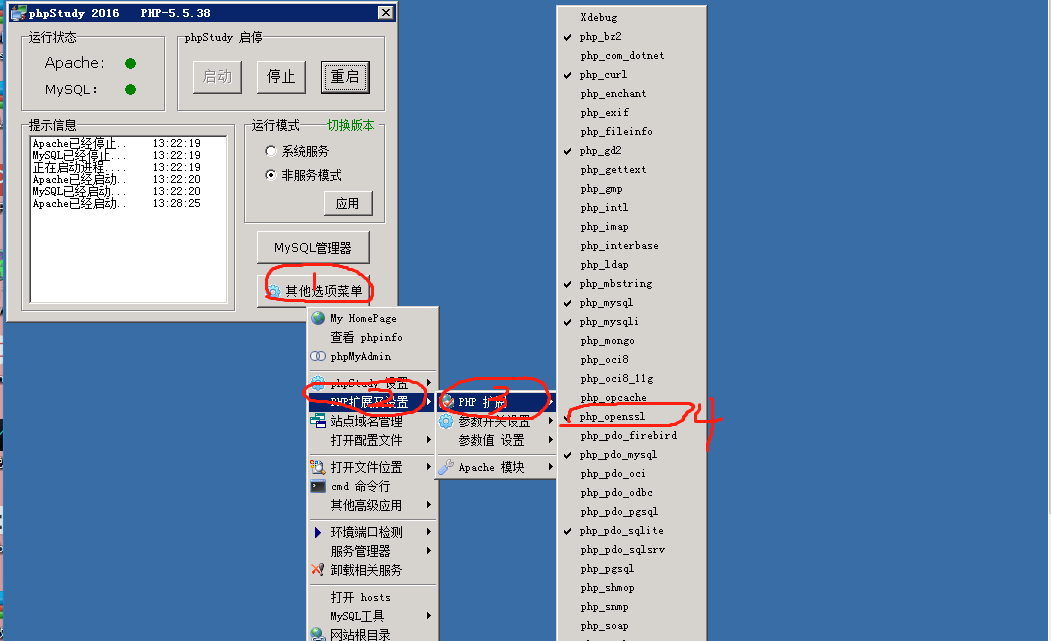
第二步:打开PHP study的这个路径D:\phpStudy\Apache\conf\ssl,把你申请好的ssl证书放进去。注意:我这边环境apache的所以选择apache的证书
腾讯云ssl证书免费申请地址:https://cloud.tencent.com/product/ssl?fromSource=gwzcw.429897.429897.429897
阿里云ssl证书免费申请地址:https://www.aliyun.com/product/cas?spm=a2c4g.11174283.2.1.17266fd4UJN7i2
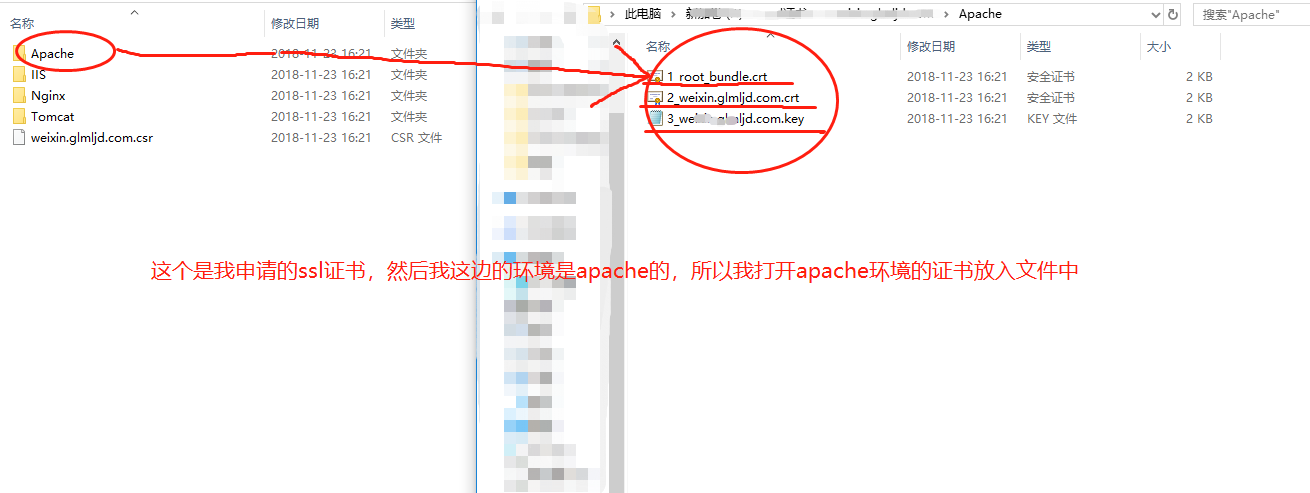
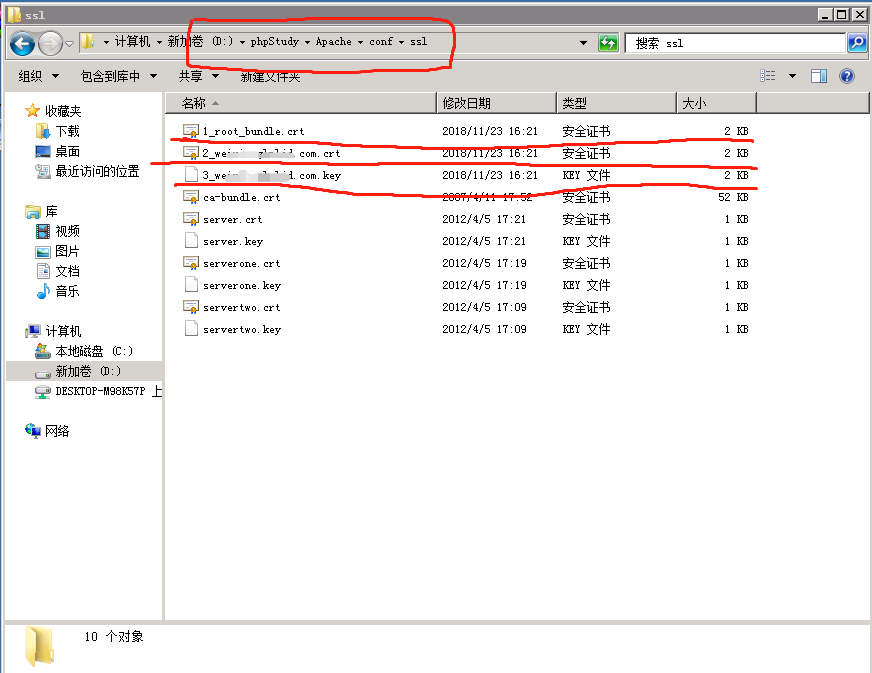
第三步:打开D:\phpStudy\Apache\conf\httpd.conf文件
#LoadModule ssl_module modules/mod_ssl.so (去掉前面的#号)
#Include conf/extra/httpd-ssl.conf
加上 Include conf/extra/weixin-ssl.conf
代码如下图所示
-
# power by phpStudy 2014 www.phpStudy.net 官网下载最新版 -
# -
# This is the main Apache HTTP server configuration file. It contains the -
# configuration directives that give the server its instructions. -
# See <URL:http://httpd.apache.org/docs/2.4/> for detailed information. -
# In particular, see -
# <URL:http://httpd.apache.org/docs/2.4/mod/directives.html> -
# for a discussion of each configuration directive. -
# -
# Do NOT simply read the instructions in here without understanding -
# what they do. They're here only as hints or reminders. If you are unsure -
# consult the online docs. You have been warned. -
# -
# Configuration and logfile names: If the filenames you specify for many -
# of the server's control files begin with "/" (or "drive:/" for Win32), the -
# server will use that explicit path. If the filenames do *not* begin -
# with "/", the value of ServerRoot is prepended -- so "logs/access_log" -
# with ServerRoot set to "/usr/local/apache2" will be interpreted by the -
# server as "/usr/local/apache2/logs/access_log", whereas "/logs/access_log" -
# will be interpreted as '/logs/access_log'. -
# -
# NOTE: Where filenames are specified, you must use forward slashes -
# instead of backslashes (e.g., "c:/apache" instead of "c:\apache"). -
# If a drive letter is omitted, the drive on which httpd.exe is located -
# will be used by default. It is recommended that you always supply -
# an explicit drive letter in absolute paths to avoid confusion. -
# -
# ServerRoot: The top of the directory tree under which the server's -
# configuration, error, and log files are kept. -
# -
# Do not add a slash at the end of the directory path. If you point -
# ServerRoot at a non-local disk, be sure to specify a local disk on the -
# Mutex directive, if file-based mutexes are used. If you wish to share the -
# same ServerRoot for multiple httpd daemons, you will need to change at -
# least PidFile. -
# -
ServerRoot "D:/phpStudy/Apache" -
# -
# Mutex: Allows you to set the mutex mechanism and mutex file directory -
# for individual mutexes, or change the global defaults -
# -
# Uncomment and change the directory if mutexes are file-based and the default -
# mutex file directory is not on a local disk or is not appropriate for some -
# other reason. -
# -
# Mutex default:logs -
# -
# Listen: Allows you to bind Apache to specific IP addresses and/or -
# ports, instead of the default. See also the <VirtualHost> -
# directive. -
# -
# Change this to Listen on specific IP addresses as shown below to -
# prevent Apache from glomming onto all bound IP addresses. -
# -
#Listen 12.34.56.78:80 -
Listen 9096 -
# -
# Dynamic Shared Object (DSO) Support -
# -
# To be able to use the functionality of a module which was built as a DSO you -
# have to place corresponding `LoadModule' lines at this location so the -
# directives contained in it are actually available _before_ they are used. -
# Statically compiled modules (those listed by `httpd -l') do not need -
# to be loaded here. -
# -
# Example: -
# LoadModule foo_module modules/mod_foo.so -
# -
LoadModule access_compat_module modules/mod_access_compat.so -
LoadModule actions_module modules/mod_actions.so -
LoadModule alias_module modules/mod_alias.so -
LoadModule allowmethods_module modules/mod_allowmethods.so -
LoadModule asis_module modules/mod_asis.so -
LoadModule auth_basic_module modules/mod_auth_basic.so -
#LoadModule auth_digest_module modules/mod_auth_digest.so -
#LoadModule authn_anon_module modules/mod_authn_anon.so -
LoadModule authn_core_module modules/mod_authn_core.so -
#LoadModule authn_dbd_module modules/mod_authn_dbd.so -
#LoadModule authn_dbm_module modules/mod_authn_dbm.so -
LoadModule authn_file_module modules/mod_authn_file.so -
#LoadModule authn_socache_module modules/mod_authn_socache.so -
#LoadModule authnz_ldap_module modules/mod_authnz_ldap.so -
LoadModule authz_core_module modules/mod_authz_core.so -
#LoadModule authz_dbd_module modules/mod_authz_dbd.so -
#LoadModule authz_dbm_module modules/mod_authz_dbm.so -
LoadModule authz_groupfile_module modules/mod_authz_groupfile.so -
LoadModule authz_host_module modules/mod_authz_host.so -
#LoadModule authz_owner_module modules/mod_authz_owner.so -
LoadModule authz_user_module modules/mod_authz_user.so -
LoadModule autoindex_module modules/mod_autoindex.so -
#LoadModule buffer_module modules/mod_buffer.so -
#LoadModule cache_module modules/mod_cache.so -
#LoadModule cache_disk_module modules/mod_cache_disk.so -
#LoadModule cern_meta_module modules/mod_cern_meta.so -
LoadModule cgi_module modules/mod_cgi.so -
#LoadModule charset_lite_module modules/mod_charset_lite.so -
#LoadModule data_module modules/mod_data.so -
#LoadModule dav_module modules/mod_dav.so -
#LoadModule dav_fs_module modules/mod_dav_fs.so -
#LoadModule dav_lock_module modules/mod_dav_lock.so -
#LoadModule dbd_module modules/mod_dbd.so -
#LoadModule deflate_module modules/mod_deflate.so -
LoadModule dir_module modules/mod_dir.so -
#LoadModule dumpio_module modules/mod_dumpio.so -
LoadModule env_module modules/mod_env.so -
#LoadModule expires_module modules/mod_expires.so -
#LoadModule ext_filter_module modules/mod_ext_filter.so -
#LoadModule file_cache_module modules/mod_file_cache.so -
#LoadModule filter_module modules/mod_filter.so -
#LoadModule headers_module modules/mod_headers.so -
#LoadModule heartbeat_module modules/mod_heartbeat.so -
#LoadModule heartmonitor_module modules/mod_heartmonitor.so -
#LoadModule ident_module modules/mod_ident.so -
#LoadModule imagemap_module modules/mod_imagemap.so -
LoadModule include_module modules/mod_include.so -
#LoadModule info_module modules/mod_info.so -
LoadModule isapi_module modules/mod_isapi.so -
#LoadModule lbmethod_bybusyness_module modules/mod_lbmethod_bybusyness.so -
#LoadModule lbmethod_byrequests_module modules/mod_lbmethod_byrequests.so -
#LoadModule lbmethod_bytraffic_module modules/mod_lbmethod_bytraffic.so -
#LoadModule lbmethod_heartbeat_module modules/mod_lbmethod_heartbeat.so -
#LoadModule ldap_module modules/mod_ldap.so -
#LoadModule logio_module modules/mod_logio.so -
LoadModule log_config_module modules/mod_log_config.so -
#LoadModule log_debug_module modules/mod_log_debug.so -
#LoadModule log_forensic_module modules/mod_log_forensic.so -
#LoadModule lua_module modules/mod_lua.so -
LoadModule mime_module modules/mod_mime.so -
#LoadModule mime_magic_module modules/mod_mime_magic.so -
LoadModule negotiation_module modules/mod_negotiation.so -
#LoadModule proxy_module modules/mod_proxy.so -
#LoadModule proxy_ajp_module modules/mod_proxy_ajp.so -
#LoadModule proxy_balancer_module modules/mod_proxy_balancer.so -
#LoadModule proxy_connect_module modules/mod_proxy_connect.so -
#LoadModule proxy_express_module modules/mod_proxy_express.so -
#LoadModule proxy_fcgi_module modules/mod_proxy_fcgi.so -
#LoadModule proxy_ftp_module modules/mod_proxy_ftp.so -
#LoadModule proxy_html_module modules/mod_proxy_html.so -
#LoadModule proxy_http_module modules/mod_proxy_http.so -
#LoadModule proxy_scgi_module modules/mod_proxy_scgi.so -
#LoadModule ratelimit_module modules/mod_ratelimit.so -
#LoadModule reflector_module modules/mod_reflector.so -
#LoadModule remoteip_module modules/mod_remoteip.so -
#LoadModule request_module modules/mod_request.so -
#LoadModule reqtimeout_module modules/mod_reqtimeout.so -
LoadModule rewrite_module modules/mod_rewrite.so -
#LoadModule sed_module modules/mod_sed.so -
#LoadModule session_module modules/mod_session.so -
#LoadModule session_cookie_module modules/mod_session_cookie.so -
#LoadModule session_crypto_module modules/mod_session_crypto.so -
#LoadModule session_dbd_module modules/mod_session_dbd.so -
LoadModule setenvif_module modules/mod_setenvif.so -
#LoadModule slotmem_plain_module modules/mod_slotmem_plain.so -
#LoadModule slotmem_shm_module modules/mod_slotmem_shm.so -
#LoadModule socache_dbm_module modules/mod_socache_dbm.so -
#LoadModule socache_memcache_module modules/mod_socache_memcache.so -
LoadModule socache_shmcb_module modules/mod_socache_shmcb.so -
#LoadModule speling_module modules/mod_speling.so -
LoadModule ssl_module modules/mod_ssl.so -
#LoadModule fcgid_module modules/mod_fcgid.so -
#LoadModule status_module modules/mod_status.so -
#LoadModule substitute_module modules/mod_substitute.so -
#LoadModule unique_id_module modules/mod_unique_id.so -
#LoadModule userdir_module modules/mod_userdir.so -
#LoadModule usertrack_module modules/mod_usertrack.so -
#LoadModule version_module modules/mod_version.so -
#LoadModule vhost_alias_module modules/mod_vhost_alias.so -
#LoadModule watchdog_module modules/mod_watchdog.so -
#LoadModule xml2enc_module modules/mod_xml2enc.so -
<IfModule unixd_module> -
# -
# If you wish httpd to run as a different user or group, you must run -
# httpd as root initially and it will switch. -
# -
# User/Group: The name (or #number) of the user/group to run httpd as. -
# It is usually good practice to create a dedicated user and group for -
# running httpd, as with most system services. -
# -
User daemon -
Group daemon -
</IfModule> -
# 'Main' server configuration -
# -
# The directives in this section set up the values used by the 'main' -
# server, which responds to any requests that aren't handled by a -
# <VirtualHost> definition. These values also provide defaults for -
# any <VirtualHost> containers you may define later in the file. -
# -
# All of these directives may appear inside <VirtualHost> containers, -
# in which case these default settings will be overridden for the -
# virtual host being defined. -
# -
# -
# ServerAdmin: Your address, where problems with the server should be -
# e-mailed. This address appears on some server-generated pages, such -
# as error documents. e.g. admin@your-domain.com -
# -
ServerAdmin admin@phpStudy.net -
# -
# ServerName gives the name and port that the server uses to identify itself. -
# This can often be determined automatically, but we recommend you specify -
# it explicitly to prevent problems during startup. -
# -
# If your host doesn't have a registered DNS name, enter its IP address here. -
# -
ServerName localhost -
# -
# Deny access to the entirety of your server's filesystem. You must -
# explicitly permit access to web content directories in other -
# <Directory> blocks below. -
# -
DocumentRoot "D:/www" -
<Directory /> -
Options +Indexes +FollowSymLinks +ExecCGI -
AllowOverride All -
Order allow,deny -
Allow from all -
Require all granted -
</Directory> -
# -
# Note that from this point forward you must specifically allow -
# particular features to be enabled - so if something's not working as -
# you might expect, make sure that you have specifically enabled it -
# below. -
# -
# -
# DocumentRoot: The directory out of which you will serve your -
# documents. By default, all requests are taken from this directory, but -
# symbolic links and aliases may be used to point to other locations. -
# -
# -
# DirectoryIndex: sets the file that Apache will serve if a directory -
# is requested. -
# -
<IfModule dir_module> -
DirectoryIndex index.html index.php index.htm -
</IfModule> -
# -
# The following lines prevent .htaccess and .htpasswd files from being -
# viewed by Web clients. -
# -
<Files ".ht*"> -
Require all denied -
</Files> -
# -
# ErrorLog: The location of the error log file. -
# If you do not specify an ErrorLog directive within a <VirtualHost> -
# container, error messages relating to that virtual host will be -
# logged here. If you *do* define an error logfile for a <VirtualHost> -
# container, that host's errors will be logged there and not here. -
# -
#ErrorLog "logs/error.log" -
#ErrorLog "|bin/rotatelogs.exe -l logs/error-%Y-%m-%d.log 2M" -
# -
# LogLevel: Control the number of messages logged to the error_log. -
# Possible values include: debug, info, notice, warn, error, crit, -
# alert, emerg. -
# -
LogLevel error -
<IfModule log_config_module> -
# -
# The following directives define some format nicknames for use with -
# a CustomLog directive (see below). -
# -
LogFormat "%h %l %u %t \"%r\" %>s %b \"%{Referer}i\" \"%{User-Agent}i\"" combined -
LogFormat "%h %l %u %t \"%r\" %>s %b" common -
<IfModule logio_module> -
# You need to enable mod_logio.c to use %I and %O -
LogFormat "%h %l %u %t \"%r\" %>s %b \"%{Referer}i\" \"%{User-Agent}i\" %I %O" combinedio -
</IfModule> -
# -
# The location and format of the access logfile (Common Logfile Format). -
# If you do not define any access logfiles within a <VirtualHost> -
# container, they will be logged here. Contrariwise, if you *do* -
# define per-<VirtualHost> access logfiles, transactions will be -
# logged therein and *not* in this file. -
# -
##CustomLog "logs/access.log" common -
# -
# If you prefer a logfile with access, agent, and referer information -
# (Combined Logfile Format) you can use the following directive. -
# -
#CustomLog "logs/access.log" combined -
</IfModule> -
<IfModule alias_module> -
# -
# Redirect: Allows you to tell clients about documents that used to -
# exist in your server's namespace, but do not anymore. The client -
# will make a new request for the document at its new location. -
# Example: -
# Redirect permanent /foo http://www.example.com/bar -
# -
# Alias: Maps web paths into filesystem paths and is used to -
# access content that does not live under the DocumentRoot. -
# Example: -
# Alias /webpath /full/filesystem/path -
# -
# If you include a trailing / on /webpath then the server will -
# require it to be present in the URL. You will also likely -
# need to provide a <Directory> section to allow access to -
# the filesystem path. -
# -
# ScriptAlias: This controls which directories contain server scripts. -
# ScriptAliases are essentially the same as Aliases, except that -
# documents in the target directory are treated as applications and -
# run by the server when requested rather than as documents sent to the -
# client. The same rules about trailing "/" apply to ScriptAlias -
# directives as to Alias. -
# -
#ScriptAlias /cgi-bin/ "D:/phpStudy/Apache/cgi-bin/" -
</IfModule> -
<IfModule cgid_module> -
# -
# ScriptSock: On threaded servers, designate the path to the UNIX -
# socket used to communicate with the CGI daemon of mod_cgid. -
# -
#Scriptsock cgisock -
</IfModule> -
# -
# "c:/Apache4/cgi-bin" should be changed to whatever your ScriptAliased -
# CGI directory exists, if you have that configured. -
# -
<Directory "D:/phpStudy/Apache/cgi-bin"> -
AllowOverride None -
Options None -
Require all granted -
</Directory> -
<IfModule mime_module> -
# -
# TypesConfig points to the file containing the list of mappings from -
# filename extension to MIME-type. -
# -
TypesConfig conf/mime.types -
# -
# AddType allows you to add to or override the MIME configuration -
# file specified in TypesConfig for specific file types. -
# -
#AddType application/x-gzip .tgz -
# -
# AddEncoding allows you to have certain browsers uncompress -
# information on the fly. Note: Not all browsers support this. -
# -
#AddEncoding x-compress .Z -
#AddEncoding x-gzip .gz .tgz -
# -
# If the AddEncoding directives above are commented-out, then you -
# probably should define those extensions to indicate media types: -
# -
AddType application/x-compress .Z -
AddType application/x-gzip .gz .tgz -
# -
# AddHandler allows you to map certain file extensions to "handlers": -
# actions unrelated to filetype. These can be either built into the server -
# or added with the Action directive (see below) -
# -
# To use CGI scripts outside of ScriptAliased directories: -
# (You will also need to add "ExecCGI" to the "Options" directive.) -
# -
#AddHandler cgi-script .cgi -
# For type maps (negotiated resources): -
#AddHandler type-map var -
# -
# Filters allow you to process content before it is sent to the client. -
# -
# To parse .shtml files for server-side includes (SSI): -
# (You will also need to add "Includes" to the "Options" directive.) -
# -
#AddType text/html .shtml -
#AddOutputFilter INCLUDES .shtml -
#AddType application/x-httpd-php .php .phtml -
</IfModule> -
# -
# The mod_mime_magic module allows the server to use various hints from the -
# contents of the file itself to determine its type. The MIMEMagicFile -
# directive tells the module where the hint definitions are located. -
# -
#MIMEMagicFile conf/magic -
# -
# Customizable error responses come in three flavors: -
# 1) plain text 2) local redirects 3) external redirects -
# -
# Some examples: -
#ErrorDocument 500 "The server made a boo boo." -
#ErrorDocument 404 /missing.html -
#ErrorDocument 404 "/cgi-bin/missing_handler.pl" -
#ErrorDocument 402 http://www.example.com/subscription_info.html -
# -
# -
# MaxRanges: Maximum number of Ranges in a request before -
# returning the entire resource, or one of the special -
# values 'default', 'none' or 'unlimited'. -
# Default setting is to accept 200 Ranges. -
#MaxRanges unlimited -
# -
# EnableMMAP and EnableSendfile: On systems that support it, -
# memory-mapping or the sendfile syscall may be used to deliver -
# files. This usually improves server performance, but must -
# be turned off when serving from networked-mounted -
# filesystems or if support for these functions is otherwise -
# broken on your system. -
# Defaults: EnableMMAP On, EnableSendfile Off -
# -
#EnableMMAP off -
#EnableSendfile on -
# Supplemental configuration -
# -
# The configuration files in the conf/extra/ directory can be -
# included to add extra features or to modify the default configuration of -
# the server, or you may simply copy their contents here and change as -
# necessary. -
# Server-pool management (MPM specific) -
Include conf/extra/httpd-mpm.conf -
Include conf/extra/httpd-php.conf -
# Multi-language error messages -
#Include conf/extra/httpd-multilang-errordoc.conf -
# Fancy directory listings -
#Include conf/extra/httpd-autoindex.conf -
# Language settings -
#Include conf/extra/httpd-languages.conf -
# User home directories -
#Include conf/extra/httpd-userdir.conf -
# Real-time info on requests and configuration -
#Include conf/extra/httpd-info.conf -
# Virtual hosts -
#Include conf/extra/httpd-vhosts.conf -
# Local access to the Apache HTTP Server Manual -
#Include conf/extra/httpd-manual.conf -
# Distributed authoring and versioning (WebDAV) -
#Include conf/extra/httpd-dav.conf -
# Various default settings -
#Include conf/extra/httpd-default.conf -
# Configure mod_proxy_html to understand HTML4/XHTML1 -
#<IfModule proxy_html_module> -
#Include conf/extra/proxy-html.conf -
#</IfModule> -
Include conf/vhosts.conf -
# Secure (SSL/TLS) connections -
#Include conf/extra/httpd-ssl.conf -
Include conf/extra/weixin-ssl.conf -
# -
# Note: The following must must be present to support -
# starting without SSL on platforms with no /dev/random equivalent -
# but a statically compiled-in mod_ssl. -
# -
SSLSessionCache "shmcb:logs/ssl_scache(512000)" -
SSLSessionCacheTimeout 300 -
<IfModule ssl_module> -
SSLRandomSeed startup builtin -
SSLRandomSeed connect builtin -
</IfModule> -
# Deal with user agents that deliberately violate open standards -
# -
<IfModule setenvif_module> -
BrowserMatch "MSIE 10.0;" bad_DNT -
</IfModule> -
<IfModule headers_module> -
RequestHeader unset DNT env=bad_DNT -
</IfModule>
第四步:在D:\phpStudy\Apache\conf\extra创建文件weixin-ssl.conf
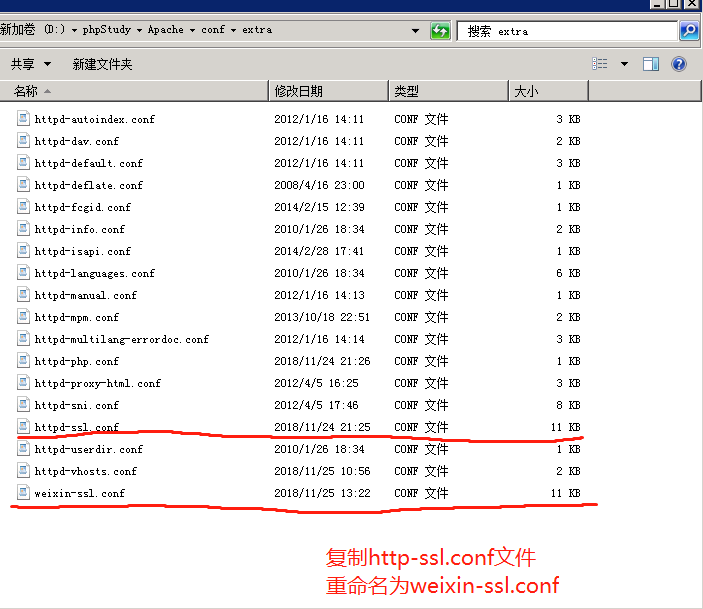
第五步:修改文件:weixin-ssl.conf
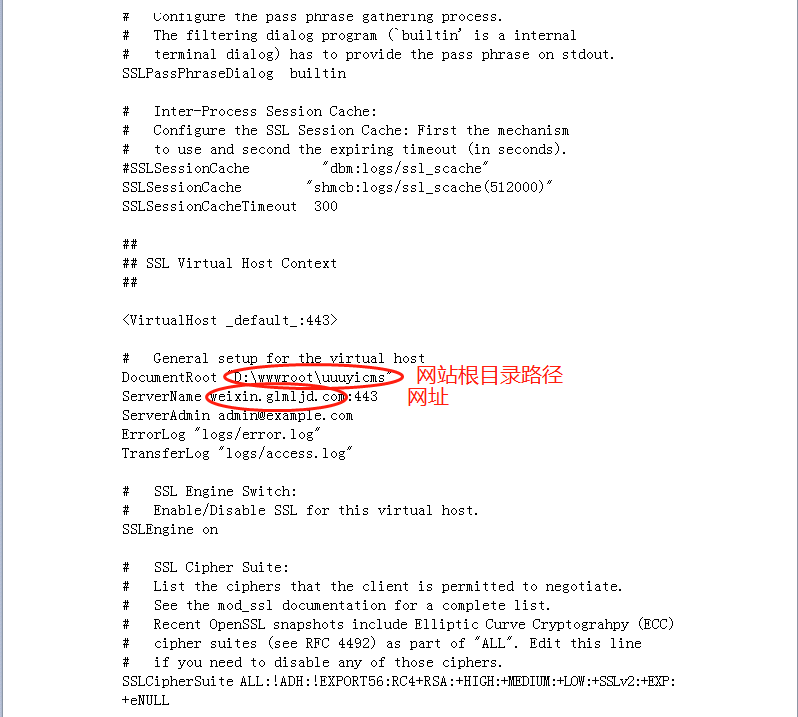
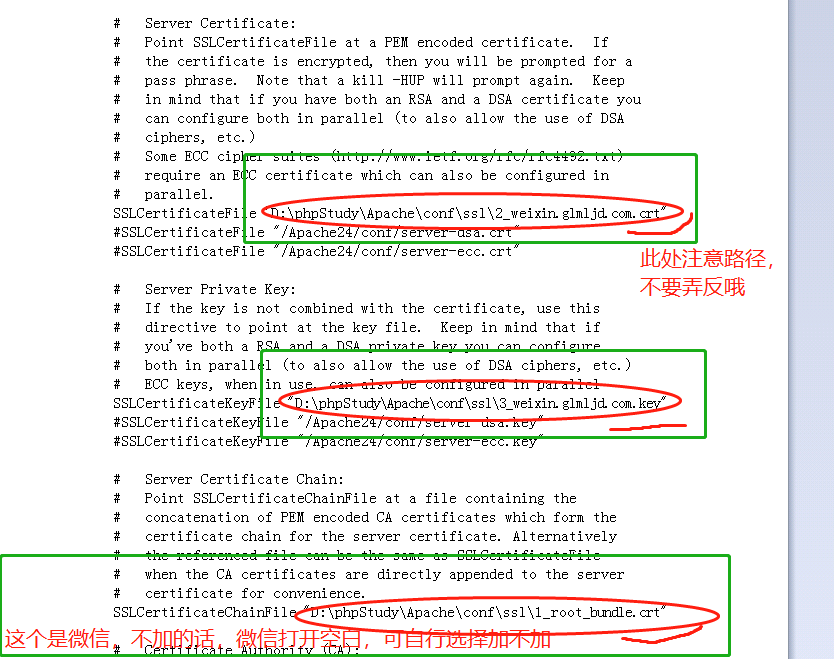
最后贴出更改后的代码
-
# -
# This is the Apache server configuration file providing SSL support. -
# It contains the configuration directives to instruct the server how to -
# serve pages over an https connection. For detailed information about these -
# directives see <URL:http://httpd.apache.org/docs/trunk/mod/mod_ssl.html> -
# -
# Do NOT simply read the instructions in here without understanding -
# what they do. They're here only as hints or reminders. If you are unsure -
# consult the online docs. You have been warned. -
# -
# -
# Pseudo Random Number Generator (PRNG): -
# Configure one or more sources to seed the PRNG of the SSL library. -
# The seed data should be of good random quality. -
# WARNING! On some platforms /dev/random blocks if not enough entropy -
# is available. This means you then cannot use the /dev/random device -
# because it would lead to very long connection times (as long as -
# it requires to make more entropy available). But usually those -
# platforms additionally provide a /dev/urandom device which doesn't -
# block. So, if available, use this one instead. Read the mod_ssl User -
# Manual for more details. -
# -
#SSLRandomSeed startup file:/dev/random 512 -
#SSLRandomSeed startup file:/dev/urandom 512 -
#SSLRandomSeed connect file:/dev/random 512 -
#SSLRandomSeed connect file:/dev/urandom 512 -
# -
# When we also provide SSL we have to listen to the -
# standard HTTP port (see above) and to the HTTPS port -
# -
# Note: Configurations that use IPv6 but not IPv4-mapped addresses need two -
# Listen directives: "Listen [::]:443" and "Listen 0.0.0.0:443" -
# -
Listen 443 -
## -
## SSL Global Context -
## -
## All SSL configuration in this context applies both to -
## the main server and all SSL-enabled virtual hosts. -
## -
# Pass Phrase Dialog: -
# Configure the pass phrase gathering process. -
# The filtering dialog program (`builtin' is a internal -
# terminal dialog) has to provide the pass phrase on stdout. -
SSLPassPhraseDialog builtin -
# Inter-Process Session Cache: -
# Configure the SSL Session Cache: First the mechanism -
# to use and second the expiring timeout (in seconds). -
#SSLSessionCache "dbm:logs/ssl_scache" -
SSLSessionCache "shmcb:logs/ssl_scache(512000)" -
SSLSessionCacheTimeout 300 -
## -
## SSL Virtual Host Context -
## -
<VirtualHost _default_:443> -
# General setup for the virtual host -
DocumentRoot "D:\wwwroot\uuuyicms" -
ServerName weixin.glmljd.com:443 -
ServerAdmin admin@example.com -
ErrorLog "logs/error.log" -
TransferLog "logs/access.log" -
# SSL Engine Switch: -
# Enable/Disable SSL for this virtual host. -
SSLEngine on -
# SSL Cipher Suite: -
# List the ciphers that the client is permitted to negotiate. -
# See the mod_ssl documentation for a complete list. -
# Recent OpenSSL snapshots include Elliptic Curve Cryptograhpy (ECC) -
# cipher suites (see RFC 4492) as part of "ALL". Edit this line -
# if you need to disable any of those ciphers. -
SSLCipherSuite ALL:!ADH:!EXPORT56:RC4+RSA:+HIGH:+MEDIUM:+LOW:+SSLv2:+EXP:+eNULL -
# Server Certificate: -
# Point SSLCertificateFile at a PEM encoded certificate. If -
# the certificate is encrypted, then you will be prompted for a -
# pass phrase. Note that a kill -HUP will prompt again. Keep -
# in mind that if you have both an RSA and a DSA certificate you -
# can configure both in parallel (to also allow the use of DSA -
# ciphers, etc.) -
# Some ECC cipher suites (http://www.ietf.org/rfc/rfc4492.txt) -
# require an ECC certificate which can also be configured in -
# parallel. -
SSLCertificateFile "D:\phpStudy\Apache\conf\ssl\2_weixin.glmljd.com.crt" -
#SSLCertificateFile "/Apache24/conf/server-dsa.crt" -
#SSLCertificateFile "/Apache24/conf/server-ecc.crt" -
# Server Private Key: -
# If the key is not combined with the certificate, use this -
# directive to point at the key file. Keep in mind that if -
# you've both a RSA and a DSA private key you can configure -
# both in parallel (to also allow the use of DSA ciphers, etc.) -
# ECC keys, when in use, can also be configured in parallel -
SSLCertificateKeyFile "D:\phpStudy\Apache\conf\ssl\3_weixin.glmljd.com.key" -
#SSLCertificateKeyFile "/Apache24/conf/server-dsa.key" -
#SSLCertificateKeyFile "/Apache24/conf/server-ecc.key" -
# Server Certificate Chain: -
# Point SSLCertificateChainFile at a file containing the -
# concatenation of PEM encoded CA certificates which form the -
# certificate chain for the server certificate. Alternatively -
# the referenced file can be the same as SSLCertificateFile -
# when the CA certificates are directly appended to the server -
# certificate for convenience. -
SSLCertificateChainFile "D:\phpStudy\Apache\conf\ssl\1_root_bundle.crt" -
# Certificate Authority (CA): -
# Set the CA certificate verification path where to find CA -
# certificates for client authentication or alternatively one -
# huge file containing all of them (file must be PEM encoded) -
# Note: Inside SSLCACertificatePath you need hash symlinks -
# to point to the certificate files. Use the provided -
# Makefile to update the hash symlinks after changes. -
#SSLCACertificatePath "/Apache24/conf/ssl.crt" -
#SSLCACertificateFile "/Apache24/conf/ssl.crt/ca-bundle.crt" -
# Certificate Revocation Lists (CRL): -
# Set the CA revocation path where to find CA CRLs for client -
# authentication or alternatively one huge file containing all -
# of them (file must be PEM encoded) -
# Note: Inside SSLCARevocationPath you need hash symlinks -
# to point to the certificate files. Use the provided -
# Makefile to update the hash symlinks after changes. -
#SSLCARevocationPath "/Apache24/conf/ssl.crl" -
#SSLCARevocationFile "/Apache24/conf/ssl.crl/ca-bundle.crl" -
# Client Authentication (Type): -
# Client certificate verification type and depth. Types are -
# none, optional, require and optional_no_ca. Depth is a -
# number which specifies how deeply to verify the certificate -
# issuer chain before deciding the certificate is not valid. -
#SSLVerifyClient require -
#SSLVerifyDepth 10 -
# Access Control: -
# With SSLRequire you can do per-directory access control based -
# on arbitrary complex boolean expressions containing server -
# variable checks and other lookup directives. The syntax is a -
# mixture between C and Perl. See the mod_ssl documentation -
# for more details. -
#<Location /> -
#SSLRequire ( %{SSL_CIPHER} !~ m/^(EXP|NULL)/ \ -
# and %{SSL_CLIENT_S_DN_O} eq "Snake Oil, Ltd." \ -
# and %{SSL_CLIENT_S_DN_OU} in {"Staff", "CA", "Dev"} \ -
# and %{TIME_WDAY} >= 1 and %{TIME_WDAY} <= 5 \ -
# and %{TIME_HOUR} >= 8 and %{TIME_HOUR} <= 20 ) \ -
# or %{REMOTE_ADDR} =~ m/^192\.76\.162\.[0-9]+$/ -
#</Location> -
# SSL Engine Options: -
# Set various options for the SSL engine. -
# o FakeBasicAuth: -
# Translate the client X.509 into a Basic Authorisation. This means that -
# the standard Auth/DBMAuth methods can be used for access control. The -
# user name is the `one line' version of the client's X.509 certificate. -
# Note that no password is obtained from the user. Every entry in the user -
# file needs this password: `xxj31ZMTZzkVA'. -
# o ExportCertData: -
# This exports two additional environment variables: SSL_CLIENT_CERT and -
# SSL_SERVER_CERT. These contain the PEM-encoded certificates of the -
# server (always existing) and the client (only existing when client -
# authentication is used). This can be used to import the certificates -
# into CGI scripts. -
# o StdEnvVars: -
# This exports the standard SSL/TLS related `SSL_*' environment variables. -
# Per default this exportation is switched off for performance reasons, -
# because the extraction step is an expensive operation and is usually -
# useless for serving static content. So one usually enables the -
# exportation for CGI and SSI requests only. -
# o StrictRequire: -
# This denies access when "SSLRequireSSL" or "SSLRequire" applied even -
# under a "Satisfy any" situation, i.e. when it applies access is denied -
# and no other module can change it. -
# o OptRenegotiate: -
# This enables optimized SSL connection renegotiation handling when SSL -
# directives are used in per-directory context. -
#SSLOptions +FakeBasicAuth +ExportCertData +StrictRequire -
<FilesMatch "\.(cgi|shtml|phtml|php)$"> -
SSLOptions +StdEnvVars -
</FilesMatch> -
<Directory "/Apache24/cgi-bin"> -
SSLOptions +StdEnvVars -
</Directory> -
# SSL Protocol Adjustments: -
# The safe and default but still SSL/TLS standard compliant shutdown -
# approach is that mod_ssl sends the close notify alert but doesn't wait for -
# the close notify alert from client. When you need a different shutdown -
# approach you can use one of the following variables: -
# o ssl-unclean-shutdown: -
# This forces an unclean shutdown when the connection is closed, i.e. no -
# SSL close notify alert is sent or allowed to be received. This violates -
# the SSL/TLS standard but is needed for some brain-dead browsers. Use -
# this when you receive I/O errors because of the standard approach where -
# mod_ssl sends the close notify alert. -
# o ssl-accurate-shutdown: -
# This forces an accurate shutdown when the connection is closed, i.e. a -
# SSL close notify alert is send and mod_ssl waits for the close notify -
# alert of the client. This is 100% SSL/TLS standard compliant, but in -
# practice often causes hanging connections with brain-dead browsers. Use -
# this only for browsers where you know that their SSL implementation -
# works correctly. -
# Notice: Most problems of broken clients are also related to the HTTP -
# keep-alive facility, so you usually additionally want to disable -
# keep-alive for those clients, too. Use variable "nokeepalive" for this. -
# Similarly, one has to force some clients to use HTTP/1.0 to workaround -
# their broken HTTP/1.1 implementation. Use variables "downgrade-1.0" and -
# "force-response-1.0" for this. -
BrowserMatch ".*MSIE.*" \ -
nokeepalive ssl-unclean-shutdown \ -
downgrade-1.0 force-response-1.0 -
# Per-Server Logging: -
# The home of a custom SSL log file. Use this when you want a -
# compact non-error SSL logfile on a virtual host basis. -
CustomLog "logs/ssl_request.log" \ -
"%t %h %{SSL_PROTOCOL}x %{SSL_CIPHER}x \"%r\" %b" -
</VirtualHost>
然后再重启PHP study即可生效。
【版权声明】
本站部分内容来源于互联网,本站不拥有所有权,不承担相关法律责任。如果发现本站有侵权的内容,欢迎发送邮件至masing@13sy.com 举报,并提供相关证据,一经查实,本站将立刻删除涉嫌侵权内容。
